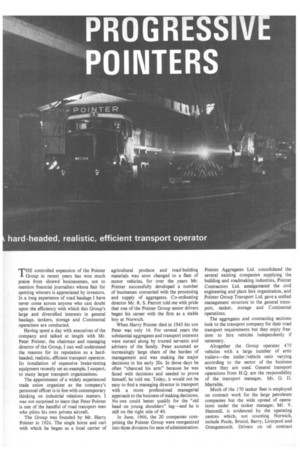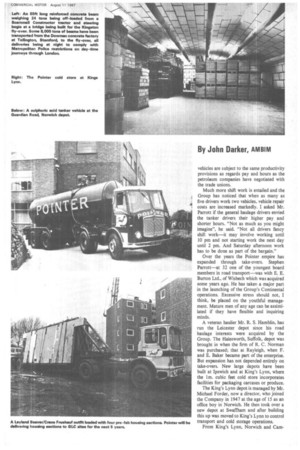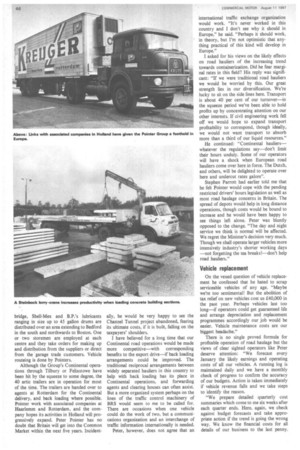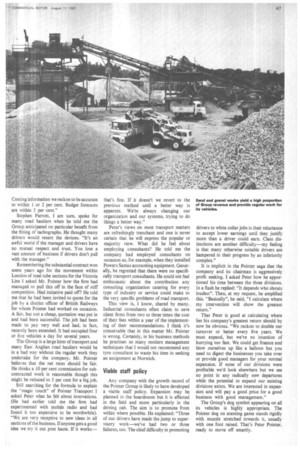POINTERS
Page 46

Page 47

Page 48

Page 49

If you've noticed an error in this article please click here to report it so we can fix it.
THE controlled expansion of the Pointer Group in recent years has won much praise from shrewd businessmen, not to mention financial journalists whose flair for spotting winners is appreciated by investors. In a long experience of road haulage I have never come across anyone who cast doubt upon the efficiency with which this Group's large and diversified interests in general haulage, tankers, storage and Continental operations are conducted.
Having spent a day with executives of the company and talked at length with Mr. Peter Pointer, the chairman and managing director of the Group, I can well understand the reasons for its reputation as a hardheaded, realistic, efficient transport operator. Its installation of expensive brake-testing equipment recently set an example, I suspect, to many larger transport organizations.
The appointment of a widely experienced trade union organizer as the company's personnel officer is in line with contemporary thinking on industrial relations matters. I was not surprised to learn that Peter Pointer is one of the handful of road transport men who pilots his own private aircraft.
The Group was founded by Mr. Harry Pointer in 1924. The single horse and cart with which he began as a local carrier of agricultural produce and road-building materials was soon changed to a fleet of motor vehicles, for over the years Mr. Pointer successfully developed a number of businesses connected with the processing and supply of aggregates. Co-ordinating director Mr. R. S. Parrott told me with pride that one of the Pointer Group senior drivers began his career with the firm as a stable boy at Norwich.
When Harry Pointer died in 1943 his son Peter was only 14. For several years the substantial aggregates and transport interests were nursed along by trusted servants and advisers of the family. Peter assumed an increasingly large share of the burden of management and was making the major decisions in his early 20s. In those days he often "chanced his arm" because he was faced with decisions and needed to prove himself, he told me. Today, it would not be easy to find a managing director in transport with a more professional managerial approach to the business of making decisions. No one could better qualify for the "old head on young shoulders" tag—and he is still on the right side of 40.
In June, 1966, the 20 companies comprising the Pointer Group were reorganized into three divisions for ease of administration. Pointer Aggregates Ltd. consolidated the several existing companies supplying the building and roadmaking industries, Pointer Contractors Ltd. amalgamated the civil engineering and plant hire organization, and Pointer Group Transport Ltd. gave a unified management structure to the general transport, tanker, storage and Continental operations.
The aggregates and contracting sections look to the transport company for their road transport requirements but they enjoy freedom to hire vehicles independently if necessary.
Altogether the Group operates 475 vehicles with a large number of artic trailers—the trailer /vehicle ratio varying according to the sector of the business where they are used. General transport operations from H.Q. are the responsibility of the transport manager, Mr. G. D. Marrable.
Much of the 170 tanker fleet is employed on contract work for the large petroleum companies but the wide spread of operations under the tanker manager, Mr. V. Hammill, is evidenced by the operating centres which, not counting Norwich, include Poole, Bristol, Barry, Liverpool and Grangemouth. Drivers on oil contract vehicles are subject to the same productivity provisions as regards pay and hours as the petroleum companies have negotiated with the trade unions.
Much more shift work is entailed and the Group has noticed that when as many as five drivers work two vehicles, vehicle repair costs are increased markedly. I asked Mr. Parrott if the general haulage drivers envied the tanker drivers their higher pay and shorter hours. "Not as much as you might imagine", he said. "Not all drivers fancy shift work—it may involve working until 10 pm and not starting work the next day until 2 pm. And Saturday afternoon work has to be done as part of the bargain."
Over the years the Pointer empire has expanded through take-overs. Stephen Parrott—at 32 one of the youngest board members in road transport—was with E. E. Burton Ltd., of Wisbech which was acquired some years ago. He has taken a major part in the launching of the Group's Continental operations. Excessive stress should not, I think, be placed on the youthful management. Mature men of any age can be assimilated if they have flexible and inquiring minds.
A veteran haulier Mr. R. S. Hamblin, has run the Leicester depot since his road haulage interests were acquired by the Group. The Halesworth, Suffolk, depot was brought in when the firm of R. C. Norman was purchased; that at Rayleigh, when F. and E. Baker became part of the enterprise. But expansion has not depended entirely on take-overs. New large depots have been built at Ipswich and at King's Lynn, where the lm. cubic feet cold store incorporates facilities for packaging carcases or produce.
The King's Lynn depot is managed by Mr. Michael Forder, now a director, who joined the Company in 1947 at the age of 15 as an office boy in Norwich. He then took over a new depot at Swaffham and after building this up was moved to King's Lynn to control transport and cold storage operations.
From King's Lynn, Norwich and Cam bridge, Shell-Mex and B.P.'s lubricants ranging in size up to 45 gallon drums are distributed over an area extending to Bedford in the south and northwards to Boston. One or two storemen are employed at each centre and they take orders for making up and distribution from the suppliers or direct from the garage trade customers. Vehicle routeing is done by Pointers.
Although the Group's Continental operations through Tilbury or Felixstowe have been hit by the squeeze to some degree, the 40 artic trailers are in operation for most of the time. The trailers are handed over to agents at Rotterdam for the Continental delivery, and back loading where possible. Pointer work with associated companies at Haarlemm and Rotterdam, and the company hopes its activities in Holland will progressively expand. Peter Pointer has no doubt that Britain will get into the Common Market within the next five years. Incident
ally, he would be very happy to see the Channel Tunnel project abandoned, fearing its ultimate costs, if it is built, falling on the taxpayers' shoulders.
I have believed for a long time that our Continental road operations would be made more competitive—with corresponding benefits to the export drive—if back loading arrangements could be improved. The traditional reciprocal arrangements between widely separated hauliers in this country to help with back loading has its place in Continental operations, and forwarding agents and clearing houses can often assist. But a more organized system perhaps on the lines of the traffic control machinery of BRS would seem to me to be called for. There are occasions when one vehicle could do the work of two, but a communications organization and an interchange of traffic information internationally is needed.
Peter, however, does not agree that an international traffic exchange organization would work. "It's never worked in this country and I don't see why it should in Europe," he said. "Perhaps it should work, in theory, but I'm not optimistic that anything practical of this kind will develop in Europe."
I asked for his views on the likely effects on road hauliers of the increasing trend towards containerization. Did he fear marginal rates in this field? His reply was significant: "If we were traditional road hauliers we would be worried by this. Our great strength lies in our diversification. We're lucky to sit on the side lines here. Transport is about 40 per cent of our turnover—in the squeeze period we've been able to hold profits up by concentrating attention on our other interests. If civil engineering work fell off we would hope to expand transport profitability to correspond, though ideally, we would not want transport to absorb more than a third of our liquid resources."
He continued: "Continental hauliers— whatever the regulations say—don't limit their hours unduly. Some of our operators will have a shock when European road hauliers come over here in force. The Dutch, and others, will be delighted to operate over here and undercut rates galore".
Stephen Parrott had earlier told me that he felt Pointer would cope with the pending restricted drivers' hours legislation as well as most road haulage concerns in Britain. The spread of depots would help in long distance operations, though costs would be bound to increase and he would have been happy to see things left alone. Peter was bluntly opposed to the change. "The day and night service we think is normal will be affected. We regret the Minister's decision very much. Though we shall operate larger vehicles more intensively industry's shorter working days —not forgetting the tea breaks!—don't help road hauliers."
Vehicle replacement
On the vexed question of vehicle replacement he confessed that he hated to scrap serviceable vehicles of any age. "Maybe we're too sentimental! But the abolition of tax relief on new vehicles cost us £40,000 in the past year. Perhaps vehicles last too long—if operators could get guaranteed life and arrange depreciation and replacement programmes accordingly our job would be easier. Vehicle maintenance costs are our biggest headache."
There is no single proved formula for profitable operation of road haulage but the views of clear sighted operators like Peter deserve attention: "We forecast every January the likely earnings and operating costs of all our vehicles. A running log is maintained daily and we have a monthly check of progress to confirm the accuracy of our budgets. Action is taken immediately if vehicle revenue falls and we take steps to identify the reason.
"We prepare detailed quarterly cost summaries which come to me six weeks after each quarter ends. Here, again, we check against budget forecasts and take appropriate action if the trend is going the wrong way. We know the financial costs for all details of our business to the last penny. Costing information we reckon to be accurate to within 1 or 2 per cent. Budget forecasts are within 5 per cent."
Stephen Parrott, I am sure, spoke for many road hauliers when he told me the Group anticipated no particular benefit from the fitting of tachographs. He thought many drivers would resent the devices. "It's an awful world if the manager and drivers have no mutual respect and trust. You lose a vast amount of business if drivers don't pull with the manager."
Remembering the substantial contract won some years ago for the movement within London of steel tube sections for the Victoria Line I asked Mr. Pointer how the firm had managed to pull this off in the face of stiff competition. Had initiative paid off? He told me that he had been invited to quote for the job by a district officer of British Railways for whom Pointer had worked on occasion. A fair, but not a cheap, quotation was put in and had been successful. The job had been made to pay very well and had, in fact, recently been extended. It had occupied four or five vehicles a day for several years.
The Group is a large hirer of transport and many East Anglian road hauliers would be in a bad way without the regular work they undertake for the company. Mr. Pointer believes that the net rates should be fair. He thinks a 10 per cent commission for subcontracted work is reasonable though this might be reduced to 5 per cent for a big job.
Still searching for the formula to explain the -magic touch" of Pointer Transport I asked Peter what he felt about innovations. (He had earlier told me the firm had experimented with mobile radio and had found it too expensive to be worthwhile). "We are very receptive to new ideas in all sections of the business. If anyone gets a good idea we try it out post haste. If it works—
that's fine. If it doesn't we revert to the previous method until a better way is apparent. We're always changing our organization and our systems, trying to do things a better way."
Peter's views on most transport matters are refreshingly trenchant and one is never certain that he will express the popular or majority view. What did he feel about employing consultants? He told me the company had employed consultants on occasion as, for example, when they installed Powers Samas accounting equipment. Generally, he regretted that there were no specifically transport consultants. He could not feel enthusiastic about the contribution any consulting organization catering for every type of industry or service could make to the very specific problems of road transport.
This view is, I know, shared by many. Industrial consultants often claim to save client firms from two to three times the cost of their fees within a year of the implementing of their recommendations. I think it's conceivable that in this matter Mr. Pointer is wrong. Certainly, in his business methods he practises so many modern management techniques that I would not recommend any tyro consultant to waste his time in seeking an assignment at Norwich.
Viable staff policy
Any company with the growth record of the Pointer Group is likely to have developed a viable staff policy. Expansion may be planned in the boardroom but it is effected in the field and more particularly in the driving cab. The aim is to promote from within where possible. He explained: "Three of our drivers have made the jump to supervisory work—we've had two or three failures, too. The chief difficulty in promoting drivers to white collar jobs is their reluctance to accept lower earnings until they justify more than a driver could earn. Class distinctions are another difficulty—my feeling is that many otherwise suitable drivers are hampered in their progress by an inferiority complex."
It is implicit in the Pointer saga that the company and its chairman is aggressively profit seeking. I asked Peter how he apportioned his time between the three divisions. In a flash he replied: "It depends who shouts loudest". Then, at my request, he amplified this. "Basically", he said, "I calculate where my intervention will show the greatest return."
That Peter is good at calculating where lies his company's greatest return should by now be obvious. "We reckon to double our turnover or better every five years. We must expand, but we've no intention of hurrying too fast. We could get finance and blow ourselves up like a balloon but you need to digest the businesses you take over or provide good managers for your normal expansion. If none of our divisions were profitable we'd look elsewhere but we see no point in any radically new departures while the potential to expand our existing divisions exists. We are interested in expansion and will pay a good price for a good business with good management."
The Group's dog symbol appearing on all its vehicles is highly appropriate. The Pointer dog on scenting game stands rigidly with muzzle stretched towards it, usually with one foot raised. That's Peter Pointer, ready to move off smartly.












































































































